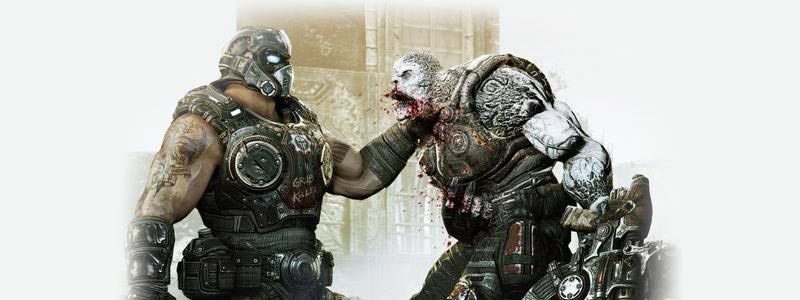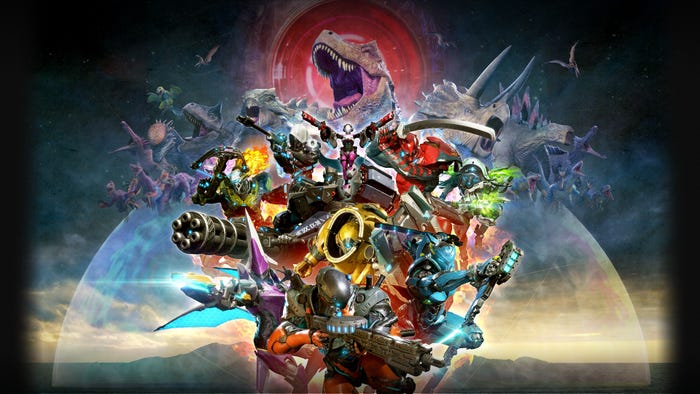Gears OF War 3 And Genocide
A serious view on Gears Of War’s mythology and its disturbing conclusion. And a try at making sense of it all. No cursing, no sarcasm, rhetorical questions or hyperbole. But some spoilers and strong words.

Epic Games delivers a finale filled with fascism, genocide and hate, and sells it as a victory story. But maybe that is exactly what the target audience needs right now.
A serious view on Gears Of War’s mythology and its disturbing conclusion. And a try at making sense of it all. No cursing, no sarcasm, rhetorical questions or hyperbole. But some spoilers and strong words.

This was a pretty hard article to write for me, because I have a hard time wrapping my head around the idea of somebody finding the way the trilogy ended appealing. To me it was just offensive and disturbing. The only way I see to possibly find any satisfaction from this ending is from an American perspective. A perspective I have no actual insight into.
The mythology of Gears did put me as the player in a position I’m not at all comfortable with. I did my fair share of virtual kills and fatalities, accepted many stereotyping enemy clichés as entertaining cannon fodder and allowed myself to even dwell in pretend misogyny. Sometimes without caring much and sometimes by being able to put aside the socially questionable or downright wrong implications of video game narrative.
Gears of War 3 made that impossible for me. I was disturbed by the way the story ended and felt like I was playing a villain all the time but nobody told me. Where I was hoping for redeeming value I was answered with confirmation of unimaginable and unrelatable sentiments.
Four things need to be discussed:
1. the strong analogy of the Gears v Locusts conflict to US wars 2. the final solution for the Locust problem 3. the justification attempts for the final solution 4. the explicit and conscious rejection of reason
1. analogy
Here are a couple of major plot points and motifs that make Gears Of War analog to US war conflicts.
Gears are exclusively US citizens:
Language, names, iconography and ethnic mix make the Gears to be a stylized mirror image of US citizens. What could have been a cultural mix or something vague, is defined to be distinctively US American. Strongest represented by the characters of Cole and Dizzy. Cole is an American Football playing and ebonics speaking black character. And Dizzy is a caucasian character wearing a cowboy hat, speaking with a strong texan accent and is shouting “Yeee-Haw!” from time to time.
War over immulsion:
Humans in search of immulsion, a valuable liquid fuel source to be found underground, invaded and damaged the cave habitat of the Locusts, forcing them to head to the surface. Oil immulsion pumping stations also get destroyed by the final solution machine in the end, defining the greed for immulsion as a root of evil. The characters refer to the war as a “war over immulsion” critically.
Waging a “war for oil” is a popular subject for criticism against the US engagement in war against Iraq under President George W. Bush.
9/11 Trauma:
When the war over immulsion escalates, Locusts resort to attacking human cities, killing large numbers of civilians and making sky scrapers collapse. The invasion of the Locust territory (in GoW 2) as a response to the attacks against human cities is directly analog to the invasion of Afghanistan as a response to the attack on New York.
“We are taking the fight to them.”
Tolls of war:
The world of Gears is a former prosperous Nation being emotionally and economically wrecked by years of ongoing conflict and the public (so called Stranded) are distrustful towards the military leadership. Since 2001, the US is entangled in wars, the Afghanistan war being on for the full 10 years now. Economic dire straits, personal human suffering due to drafts, fear of terrorist attacks and a distrust in government are a result of that.
Connecting the dots:
Putting the image of the Gears, the timeline of unfolding events in the war, the immulsion motif and the terroristic nature of the Locusts together, you get a fairly strong but distorted mirror image of the current political climate and situation surrounding the engagement of US forces in the middle east.
This all makes it pretty hard for me to not regard the way the fictional conflict is resolved in Gears3 as a fantasy blueprint to end the current US wars.
2. final solution
I know it’s the internet. Bloggers and commenters are playing the Hitler-card like nobody’s business. And yeah, usually those people think they are making a point, but just fail by drawing a completely ridiculous comparison between their minor complaint and a unfathomable act of madness and injustice.
But in this case it is the meat of the problem.
“Final solution” (german: Endlösung), for those who don’t know, is a euphemism coined by officials of the Third Reich. It was used to sell the idea of completely eradicating the jewish people in Nazi Germany.
The holocaust. If you don’t know the history behind that word, look it up. Seriously. I’m a german, I live in Berlin, I know that history.
The Nazis had found a way to basically industrialize the killing of people of jewish heritage (and political enemies) by hunting jews, imprisoning them in work camps and using gas chambers to finally kill them. The goal was to eradicate jews as part of an idea of them being a lower inherently evil race. Genetical distinctions, were used to artificially define an enemy worthy of total annihilation.
And as it turns out, launching a super holocaust to solve the Locust problem, worse and more thorough than anything the Nazis were capable of, is the celebrated victory you achieve when beating the final boss of Gears Of War 3.
Adam Fenix (father of the protagonist) has created a machine that is capable of completely and totally killing off every single Locust on the planet. The blow of the machine reaches every corner of the world and is calibrated to kill off people and creatures that carry the Locust genes but does no harm to humans. A genetical distinction decides here who deserves to die and who deserves to live.
3. justification
In my view it becomes severely distasteful once the written dialogue in the game starts consciously justifying the genocide.
The character of the Locust queen, currently fighting for her people to not be completely wiped out, asks during the battle: What makes a life of her people less worthy than a human life?
On which Marcus Fenix, our stories hero, simply and confidently replies: They are not people, they are monsters.
The big problem here is… THEY ARE PEOPLE! They are an independent society, with spoken and written language, social structures, cultural treasures, art, architecture forced into becoming a war culture by human intrusion.
Granted they are barbaric and ugly. But that does not make them less than people. Trying to make other races appear to not be real or full people, dehumanizing them is the oldest trick in the book to make justifications for inhumanly behavior. Especially when there are clear visible distinctions like skin color and when the oppressive group can claim the oppressed group to be less civilized.
It is done with prisoners to beat them up, was done with slaves to keep them as property, native americans to drive them from their lands, indigenous people in colonized nations, to african tribes to justify ethnic cleansing, to jews to put them in camps and on and on and on…
Nazis referred to Jews in terms of them being a plague, vermin, pests…
…Gears call their enemy race Locusts.
This is fairly common as a plot device in scifi and fantasy stories, like for example Orcs = evil in Lord Of The Rings and subsequently Warhammer and Warcraft. But in publications like this the makers at least had the dignity to limit acts of violence against enemy races to individuals who have actually shown to be a threat…
But in Gears we should find a sense of victory in killing every single Locust on the planet, no matter if they have done anything wrong yet, no matter the age or personality. They deserve to die because of the wrong genes. This is what Adam Fenix’s machine is specifically programmed to do.
4. rejection of reason
After the final battle is won and the machine began the deletion of Locust life, the Locust queen returns to the scene to spell it out for everybody. The is no justice or moral in what the player has fought for. It is just another act of killing.
And while the queen was the only one actually talking some sense, confronting us with the injustice we committed, Marcus takes a knife and stabs the unarmed woman to death, up close and personal. Filled with rage and hatred he says: “That’s from Dom and everyone you killed, you bitch!” while she sinks lifeless to the ground.
Objections and back talk will not be tolerated.
You win!
After all that: he gets cheered and celebrated, swelling victorious music plays, he gets the girl, can finally throw away his gun armor and look into the bright future.
I cannot connect being a genocidal hate-filled grunt with being the hero deserving of praise and prizes. But then again I’m from germany and I’m not even in reach understanding how it feels to be an American under the pressure of 10 years of war.
Maybe if Osama Bin Laden had killed 3000 of my people, I could relate with fantasizing to kill him up close and personal and make it hurt, any moral implications be darned. Maybe if I knew someone who lost a limb or his life in Afghanistan, would see my country’s economy go downhill or if I had to fear to be drafted again, maybe then I could relate to the fantasy of pushing a button to just making it all go away.
I don’t know what it would take to make me find any satisfaction in what I was ultimately fighting for in Gears Of War. But I know I’m far away from that and it is discomforting to me to see that there is a market to sell genocide.
Please, if you have additional thoughts, add a comment below. I’m really looking for american perspectives on the issue, since the game primarily targets an american audience. What did I miss? What don’t I get? Thanks.
Reblogged from my home blog howtonotsuckatgamedesign.com
Read more about:
BlogsAbout the Author(s)
You May Also Like













